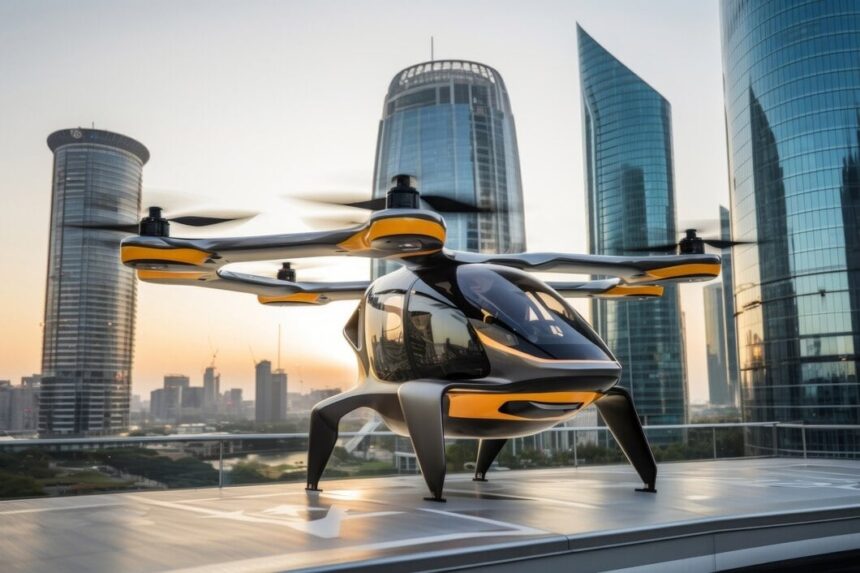In a transformative move for the urban air mobility (UAM) sector, Joby Aviation, Inc. (NYSE: JOBY) has entered into a definitive agreement to acquire the passenger business of Blade Air Mobility, Inc. (NASDAQ: BLDE) for up to $125 million. Announced on August 4, 2025, this acquisition is poised to accelerate Joby’s commercialization of its electric vertical takeoff and landing (eVTOL) aircraft, positioning the company as a frontrunner in the rapidly evolving air taxi market.
Background on Joby Aviation
Founded in 2009 and headquartered in Santa Cruz, California, Joby Aviation is a vertically integrated air mobility company dedicated to developing eVTOL aircraft for commercial passenger services. With a workforce of over 2,000 employees, Joby aims to create an aerial ridesharing service that offers a sustainable alternative to ground transportation. Its eVTOLs are designed to be quiet, efficient, and environmentally friendly, capable of carrying a pilot and four passengers up to 100 miles.
Joby is currently navigating the Federal Aviation Administration (FAA) certification process, a critical step toward launching commercial operations. According to CEO JoeBen Bevirt, the company is on track to begin FAA Type Inspection flight testing in early 2026, a milestone that will pave the way for its air taxi services in markets like the United States and Dubai.
Background on Blade Air Mobility
Established in 2014, Blade Air Mobility has become a leading name in urban air transportation, operating a helicopter ride-sharing platform that serves high-demand urban corridors. The company’s passenger business, which is the focus of this acquisition, connects passengers to key destinations such as New York City’s major airports (John F. Kennedy International and Newark Liberty) and nearby locales like the Hamptons. In 2024, Blade flew over 50,000 passengers across its network of 12 urban terminals in the U.S. and Europe.
Blade operates an asset-light model, meaning it does not own its aircraft but partners with operators to provide services. In addition to its passenger operations, Blade has a medical division specializing in organ transportation, which accounted for 84% of its adjusted segment EBITDA in 2024. This division will remain independent, rebranded as Strata Critical Medical, and will collaborate with Joby on medical transportation initiatives.
Details of the Acquisition
The acquisition, valued at up to $125 million, includes Blade’s entire passenger business in the United States and Europe. The payment structure allows Joby to choose between stock or cash, with $35 million of the total tied to performance milestones and the retention of key employees. The deal is expected to close in the coming weeks, subject to customary closing conditions.
Key assets acquired include:
Infrastructure: Blade’s network of 12 urban terminals, including dedicated lounges and terminal bases at major airports and strategic locations in Manhattan (West Side, East Side, and Wall Street).
Customer Base: A loyal customer base of over 50,000 passengers flown in 2024, providing Joby with an immediate market for its eVTOL services.
Operational Expertise: Blade’s decade of experience in urban air mobility, which includes navigating regulatory frameworks and managing high-frequency passenger operations.
Blade’s founder and CEO, Rob Wiesenthal, will continue to lead the passenger business as a wholly-owned subsidiary of Joby, ensuring continuity and expertise during the transition. The deal excludes Blade’s medical division, which will operate independently as Strata Critical Medical but will partner with Joby as its preferred VTOL provider in regions where Joby operates.
Acquisition Details | Information |
|---|---|
Target | Blade Air Mobility’s passenger business (U.S. and Europe) |
Acquiring Company | Joby Aviation, Inc. |
Transaction Value | Up to $125 million |
Payment Method | Stock or cash, at Joby’s election |
Holdbacks | $35 million, subject to performance milestones and key employee retention |
Excluded Business | Blade’s medical division (rebranded as Strata Critical Medical) |
Partnership | Joby as preferred VTOL partner for Strata’s organ transport business |
Expected Closure | Within weeks, subject to customary conditions |
Strategic Implications
The acquisition is a strategic masterstroke for Joby, offering several advantages that could accelerate its path to profitability and market leadership:
Immediate Market Access: Blade’s established routes and terminals in key urban markets, particularly New York City, provide Joby with a ready-made launchpad for its eVTOL services. This infrastructure is critical for scaling operations in high-demand urban corridors.
Customer Adoption: With over 50,000 passengers already familiar with Blade’s services, Joby can seamlessly transition these customers to its electric air taxis, reducing the need for extensive marketing to build a user base.
Operational Expertise: Blade’s decade-long experience in urban air mobility operations, including regulatory compliance and customer service, will help Joby navigate the complexities of commercial air taxi services.
Global Expansion: The inclusion of Blade’s European operations gives Joby a foothold in international markets, aligning with its plans to launch services in Dubai and potentially other regions.
Sustainability Goals: By transitioning Blade’s helicopter routes to eVTOLs, Joby can offer a quieter, more sustainable alternative, aligning with global trends toward greener transportation.
The partnership with Strata Critical Medical further enhances Joby’s prospects by opening opportunities in the medical logistics sector, a high-margin market with stable revenue streams. This collaboration could position Joby to diversify its offerings beyond passenger transport.
Market Context
The urban air mobility market is poised for significant growth, driven by rapid urbanization, traffic congestion, and the demand for sustainable transportation solutions. According to industry forecasts, the UAM market is expected to grow from approximately $4.6 billion in 2024 to over $40 billion by 2035, with compound annual growth rates (CAGR) ranging from 16% to over 30% MarketsandMarkets, Fortune Business Insights.
Key drivers include:
Urbanization: Growing urban populations are straining ground transportation networks, creating demand for faster, aerial alternatives.
Technological Advancements: Innovations in eVTOL design and autonomous flight capabilities are making air taxis more viable.
Sustainability: Electric aircraft offer a lower carbon footprint compared to traditional helicopters, aligning with global environmental goals.
Joby faces competition from other eVTOL developers such as Archer Aviation, Lilium, and Vertical Aerospace. However, by acquiring Blade, Joby gains a first-mover advantage through established infrastructure and operational know-how, potentially outpacing competitors in market penetration.
Market Reaction
The announcement of the acquisition was met with enthusiasm in the financial markets. Blade Air Mobility’s stock surged by as much as 30% in pre-market trading on August 4, 2025, reflecting investor confidence in the deal’s value for Blade’s shareholders. Joby’s stock also rose by over 5%, indicating positive sentiment toward its strategic expansion. Analysts, such as JPMorgan’s Bill Peterson, have noted that the acquisition is “net-positive for both parties given the strategic alignment,” highlighting the potential for accelerated commercialization Investing.com.
Social media platforms like X also reflected excitement, with posts noting Blade’s strong Q4 2024 performance (flight profit up 40%) and analysts rating its stock as a strong buy with 45% upside potential X Post.
Regulatory and Operational Outlook
Joby’s eVTOL aircraft are still undergoing FAA certification, a process that involves rigorous testing to ensure safety and reliability. The acquisition of Blade’s passenger business could streamline this process by leveraging Blade’s existing relationships with aviation authorities and its experience operating in regulated airspace. Blade’s permits for helicopter operations may also facilitate approvals for Joby’s eVTOLs, particularly in urban areas with established vertiport infrastructure.
During a transition phase, the combined company will operate both helicopters and Joby’s eVTOLs, eventually shifting to an all-electric fleet. This phased approach ensures continuity of service while Joby completes its certification and scales production.
Joby Aviation’s acquisition of Blade Air Mobility’s passenger business is a pivotal development in the urban air mobility industry. By integrating Blade’s infrastructure, customer base, and operational expertise, Joby is well-positioned to lead the transition from traditional helicopters to electric air taxis. As the UAM market continues to grow, this strategic move could serve as a blueprint for other eVTOL developers seeking to bridge the gap between innovation and commercialization.
With FAA certification on the horizon and a robust platform for growth, Joby Aviation is poised to redefine urban transportation, offering faster, cleaner, and more efficient travel options for cities worldwide.














